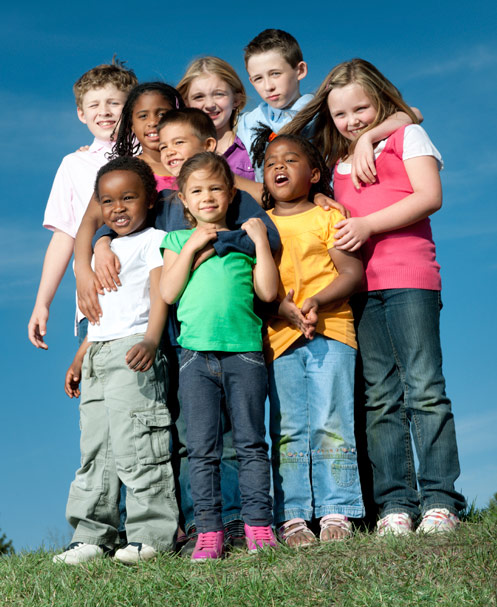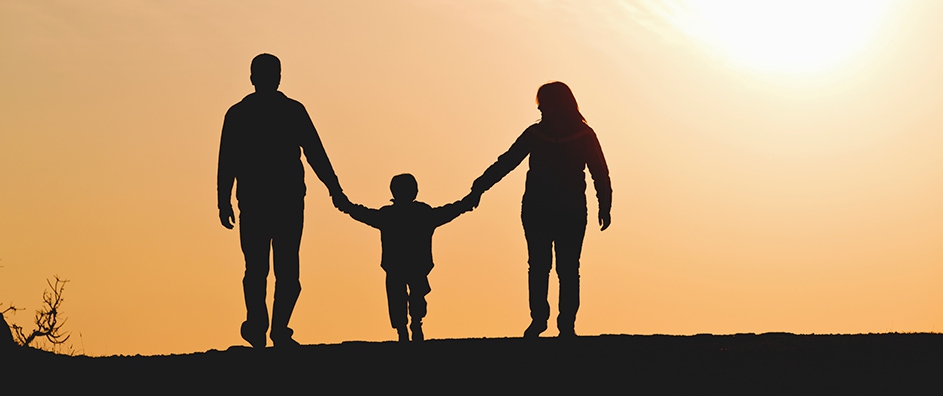The views expressed in our content reflect individual perspectives and do not represent the authoritative views of the Baha'i Faith.
You’ve probably heard the old saying attributed to the Jesuits: “Give me a child to the age of seven and I will give you the man.” It suggests that early childhood religious training forms people for life.
When you’re raised in a religious tradition from childhood, it usually seeps deeply into your consciousness, and even determines who you become as an adult. But does it ultimately help you?
That depends. Many people maintain that their religious upbringing—especially when delivered in a fundamentalist or particularly strict way–scarred them psychologically, hindered them from developing into healthy adults and brought about high levels of guilt, shame and hypocrisy. In fact, some even believe that early childhood religious indoctrination is tantamount to child abuse.
So does it help or harm children to bring them up to believe the same religion as the parents? This debate has raged for a long time. The 19th century philosopher Arthur Schopenhaur summarized it well:
If, in early childhood, certain fundamental views and doctrines are paraded with unusual solemnity, and an air of the greatest earnestness never before visible in anything else; if, at the same time, the possibility of a doubt about them be completely passed over, or touched upon only to indicate that doubt is the first step to eternal perdition, the resulting impression will be so deep that, as a rule, that is, in almost every case, doubt about them will be almost as impossible as doubt about one’s own existence. – Schopenhauer, On Religion: A Dialogue
One of the largest scientific studies ever conducted on that question, called Religion and Child Health, was published in 2010. The study’s authors–Barry R. Chiswick from the University of Illinois at Chicago and the German Institute for the Study of Labor (IZA); and Donka M. Mirtcheva from The College of New Jersey–found that children with an identified religious affiliation, who view religion as very important, and who participate at least weekly in a faith community have higher levels of overall physical and psychological health.
 Chiswick and Mirtcheva’s study of 2,604 children ages 6-19 discovered multiple positive correlations between children’s physical and psychological health and religious affiliation. The study did not just survey those with a religion, either–it included 272 children who expressed no religious affiliation at all.
Chiswick and Mirtcheva’s study of 2,604 children ages 6-19 discovered multiple positive correlations between children’s physical and psychological health and religious affiliation. The study did not just survey those with a religion, either–it included 272 children who expressed no religious affiliation at all.
The study found that children between 6-19 who regularly attend religious meetings or services tend to derive a whole host of benefits from their involvement: a significantly lower risk of suicide or suicide attempts; alcohol and drug use; and dangerous sexual behavior. The researchers who conducted the study learned that membership in a religious group can moderate unhealthy behavior, provide social support, enhance marital or financial prospects, and strengthen family bonds, if the whole family shares the religion.
So let’s say you were raised in a religion that did help you as a child—but which you now, as an adult, have started to question or doubt. What do you do? You may have derived some benefits from your early religious training; but you may also feel like you’ve matured enough to look deep within your own soul and determine your own beliefs. This can cause a conflict and a conundrum.
I met a young woman going through that exact conflict the other day. Mary (not her real name), raised Catholic and now deeply attracted to the Baha’i teachings, feels very connected to her Christian family and its cultural traditions. But she also feels a spiritual calling, a profound sense of connection and comfort when she says Baha’i prayers and studies the Baha’i writings. Her soul—that still, small inner voice we can all hear if we listen carefully—is asking her for something, and she’s really worried about how to respond.
Mary says that some of her own family’s hypocritical behaviors pushed her away from her early Catholicism—and even from religion in general. She knows, if she does decide to become a Baha’i, that her own family may judge her, because she’s seen it happen when family members criticized and judged non-Christians before. This frightens her, and makes her feel like she might even lose the love of her own family if she becomes a Baha’i. She’s worried about betraying her family, her faith and her culture. She feels conflicted and anxiety-ridden.
We talked about this for a little while, and because we only got a chance to discuss it for such a short time, I wanted to write this series of essays to address Mary’s questions, which struck me as pretty universal concerns for many people who find themselves on a path of spiritual search.
Here’s the basic principle that underpins the Baha’i view of this very important question: Baha’is believe in the independent investigation of truth. No one, the Baha’i teachings say, should ever automatically accept any religion just because they inherited it:
Discover for yourselves the reality of things, and strive to assimilate the methods by which noble-mindedness and glory are attained among the nations and people of the world.
No man should follow blindly his ancestors and forefathers. Nay, each must see with his own eyes, hear with his own ears and investigate independently in order that he may find the truth. The religion of forefathers and ancestors is based upon blind imitation. Man should investigate reality. – Abdu’l-Baha, Divine Philosophy, p. 24.
To answer the question posed in the title of this essay, inheriting your religion can certainly be helpful—but it only really becomes yours when you independently examine your beliefs and accept them because you find them true. Authentic belief, and the deep peace and serenity it can offer, only becomes possible when it belongs consciously and mindfully to you:
True religion is the source of love and agreement amongst men, the cause of the development of praiseworthy qualities; but the people are holding to the counterfeit and imitation, negligent of the reality which unifies; so they are bereft and deprived of the radiance of religion. They follow superstitions inherited from their fathers and ancestors. To such an extent has this prevailed that they have taken away the heavenly light of divine truth and sit in the darkness of imitations and imaginations. – Abdu’l-Baha, Foundations of World Unity, p. 71.
You May Also Like
Comments

















If I recall correctly, the greatest Baha'i teacher, Martha Root, joined the Faith after years of investigating
So, when I say that I recognized Baha'u'llah's name in the same second that I heard It for the first time and then immediately I joined up you can see that mysteries are involved and that we can't judge one ...another given that I had many years to make up for since the age of nine as an atheist
Anyway, I came on too strong to my dear mum and sisters. You mightn't think I've improved by the blunt way I write but believe me 25 years ago I was really pushy to mum and sis about Baha'u'llah. It's only now after all that time that a solution has emerged. We all always remained friendly but we almost never discussed spirituality for many a long year
What I had to do was continue to love them and to pray but leave them to themselves re spiritual matters. I had to understand that our closest relatives are really much closer to God than to us and vice versa. I had to learn that though I'll always love them I had to be prepared to risk losing them and take courage in my new Baha'i beliefs and brothers and sisters:
The Master says:
"Consider this text of the New Testament: the brothers of His Holiness Christ, came to Him and they said: “These are your brothers.” He answered that His brothers were those who believed in God, and refused to associate with His own brothers.
Likewise Qurratu’l-‘Ayn, [Tahireh] who is celebrated in all the world, when she believed in God and was attracted to the Divine Breaths, she forsook her two eldest sons, although they were her two oldest children, because they did not become believers, and thereafter did not meet them. She said: “All the friends of God are my children, but these two are not. I will have nothing to do with them.”
Fortunately, we rarely have to be that extreme as to totally disown our own kin because in the case of my Mary and David's Mary they don't reject God out right though they don't believe in Baha'u'llah as the return of Christ. Every one will come around in time.
Baha'i love
Paul